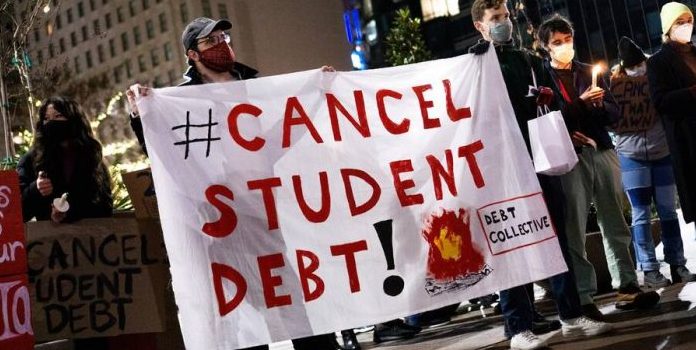A coalition of states has filed a legal challenge to President Joe Biden’s latest executive effort to forgive a portion of Americans’ student loan debt.
“With the stroke of his pen, Joe Biden is attempting to saddle working Missourians with a half trillion dollars in college debt,” Missouri Attorney General Andrew Bailey, who is helping lead the legal challenge, said in a statement.
The lawsuit came shortly after Biden announced the plan on Monday.
The states in question said it was yet another an overreach of executive authority following his failed effort ahead of the 2022 election, which was eventually shut down by the U.S. Supreme Court last June.
“The United States Constitution makes clear that the President lacks the authority to unilaterally ‘cancel’ student loan debt for millions of Americans without express permission from Congress,” Bailey said. “The President does not get to thwart the Constitution when it suits his political agenda.”
The latest scheme appears to be timed so as to coincide with the upcoming presidential election, in which Biden has seen his appeal plummet among younger voters, minorities and other key demographics.
The White House claims that Biden has so far canceled at least some of the debt for 4 million Americans, totaling $146 billion so far.
It said the newest effort would partially “forgive” debt for 30 million Americans, though independent analyses have not confirmed that figure.
Critics note that there is no such thing as government debt forgiveness, since the borrowers’ burden simply gets shifted to the tax-paying population at large, driving additional federal debt and inflation.
“This is nothing but a political ploy to buy votes in an election year,” tweeted Sen. Tommy Tuberville, R-Ala. “The Supreme Court already ruled that Joe Biden’s student loan scheme is ILLEGAL. This is not loan forgiveness—it’s debt redistribution.”
Some, in fact, argue that minorities and other lower-income population groups are disproportionately affected by it due to their decisions to forgo the expense of higher education, while privileged upper- and middle-class young adults who squander their money on useless degrees get rewarded for their poor decisions.
“Just last year, the Supreme Court struck down an attempt by the President to force teachers, truckers, and farmers to pay for the student loan debt of other Americans—to the enormous tune of $430 billion,” said the new lawsuit.
“In striking down that attempt, the Court declared that the President cannot ‘unilaterally alter large sections of the American economy,’” it continued. “Undeterred, the President is at it again, even bragging that ‘the Supreme Court blocked it. They blocked it. But that didn’t stop me.’”
There is no official cost estimate yet for the plan, but experts raised concerns about the already ballooned national debt, which is on pace to hit $35 trillion this year.
“You can’t solve a very real debt problem by issuing more debt,” Maya MacGuineas, president of the Committee for a Responsible Federal Budget, said in a statement.
“The President’s previous student loan cancellation plan was expensive, inflationary, poorly targeted, and would have boosted rather than reduced tuitions,” she added. “This plan similarly misses the mark.”
The loan-amnesty plan would be enacted through a proposed federal rule, which means it has a lengthy process ahead and could be overturned if Republicans win in November, although it will by then have already fulfilled its political purpose for Biden.
The plan would cancel as much as $20,000 in interest for borrowers whose interest on unpaid debt has continued to grow over time, regardless of income. It aims to help those with undergraduate debt who have been paying for more than 20 years and graduate debt paid for more than 25 years, suggesting either that their degrees did not add any particular value to their earning potential or that the borrower in question were simply deadbeats who opted to spend their money in other ways.
Those major components come alongside several other miscellaneous loan-amnesty efforts tailored to specific federal programs Biden has been announcing since taking office.
Biden claimed during Monday afternoon remarks in Madison, Wisconsin, that for many Americans, their debt is too great a burden.
“Today, too many Americans, especially young people, are saddled with unsustainable debts in exchange for a college degree,” Biden said. “The ability for working- and middle-class folks to repay their student loans has become so burdensome that a lot can’t repay it for even decades after being in school.”
Even before the lawsuit, Biden’s plan to forgive even more student loan debt was taking fire from Republicans and budget experts.
“By ‘cancelling student loan debt,’ Joe Biden is telling blue-collar workers he doesn’t care about them,” tweeted Sen. Ted Cruz, R-Texas. “This is nothing but a vote-buying scheme by the Democrats.”
By “cancelling student loan debt,” Joe Biden is telling blue-collar workers he doesn’t care about them.
This is nothing but a vote-buying scheme by the Democrats. pic.twitter.com/JkdbNUgA2t
— Senator Ted Cruz (@SenTedCruz) April 8, 2024
Signing onto the lawsuit are Arkansas, Florida, Georgia, Missouri, North Dakota, Ohio, and Oklahoma.
“This plan completely violates the administrative pay-as-you-go requirement put in place by last summer’s Fiscal Responsibility Act,” MacGuineas said.
“That provision was put in place to require any significant regulations from adding to deficits, but the administration has abused its ability to waive these requirements—which is intended only for regulations that are ‘necessary for the delivery of essential services’ or ‘necessary for effective program deliverym'” she added.

